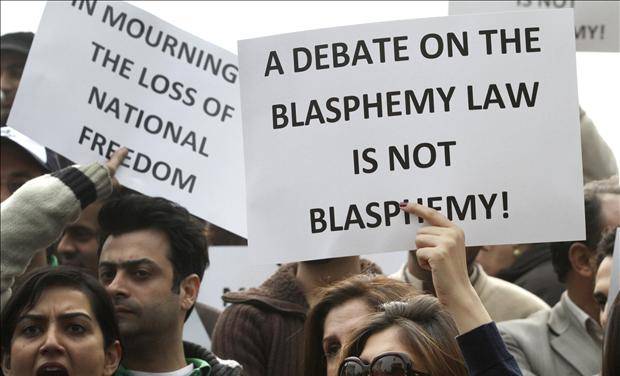ISLAMABAD: Criticising blasphemy laws does not amount to committing blasphemy, a Supreme Court judge yesterday said. Blasphemy is a highly sensitive issue in Muslim majority Pakistan and people demanding reforms in the laws governing this issue to prevent their misuse have been facing strong resistance and threats of dire consequences, even death. The apex court was hearing the appeals of Mumtaz Qadri and the federal government against Islamabad High Court’s upholding death sentence to Qadri on January 4, 2011 for killing former Punjab Governor Salmaan Taseer.
Taseer had called the controversial blasphemy law a ‘black law’ and visited in prison Aaisa Bibi, a Christian accused of uttering derogatory words against Holy Prophet Muhammad (PBUH). The court said it would have to determine whether or not former Punjab Governor Salman Taseer had committed blasphemy, as Mumtaz Qadri’s appeal is based on the assumption that the ex-governor had committed blasphemy by criticising the blasphemy law. The high court in its decision had maintained Qadri’s death sentence, awarded by Anti-Terrorism Court, but had dropped Section 7 of the Anti-Terrorism Act 1997. The law is related to creating panic and harassment in the public. The blasphemy laws were introduced during the regime of General Ziaul Haq in 1986. Around 1,194 people have been charged under these laws since then.
Pakistan Penal Code’s Section 295, which deals with the issue, dates back to pre-partition India when it was introduced in 1860 – primarily to ward of religious hatred and communal clashes. But three clauses – A, B & C – were added in Section 295 during General Zia’s era. At least 150 Christians, 564 Muslims, 459 Ahmadis and 21 Hindu have been jailed under blasphemy charges since 1986, says a report of National Commission on Justice and Peace. Prior to 1986, only 14 cases pertaining to blasphemy were reported, it added. In many cases, the laws have been misused to settle personal scores or grab properties. In a number of cases the accused were killed even before they could defend themselves in courts, and the victims include Muslims as well.
Mian Nazir Akhtar, representing Qadri, said though the blasphemy law was made during the tenure of a dictator but it is exactly in the light of Islamic teachings. “Criticism of this law is therefore totally unacceptable,” he said. Justice Asif Saeed Khan Khosa remarked if in a democratic setup people representatives can legislate laws, why they can’t criticise it. The judge questioned whether those who had challenged and criticised the establishment of military courts under 21st Amendment committed high treason under the constitution. He said rights activists condemned Zina Ordinance, adding due to their protests changes were made in the Zina Ordinance in 2005.
Justice Asif asked how condemning a law is blasphemy. He stated many times the blasphemy law had been used to encroach properties. Just to blame a person that he had committed blasphemy creates problem for that person, because people take action against him/her themselves, he said.
The court noted that the facts of the murder of former governor have been established as the convict had accepted that he killed Salmaan Taseer.
Qadri’s lawyer said the Islamabad High Court did not dispose off his client properly, as it did not examine the material provided to the court about Islamic history. The main witness in the case, Chaudhry Waqas, who was standing close to Taseer, at the time of murder, and 29 other witnesses were also not produced as material before the court at any stage, he claimed. The case was adjourned for further hearing till today.






